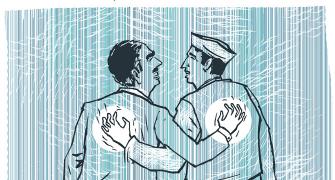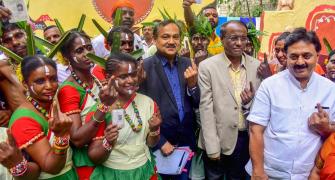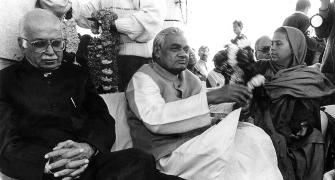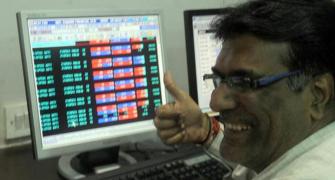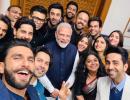‘The minorities are determined to prove Modi wrong in 2019, and the only way he can counter their mobilisation against his government is to get a bigger share of the Hindu vote,’ says Saisuresh Sivaswamy.
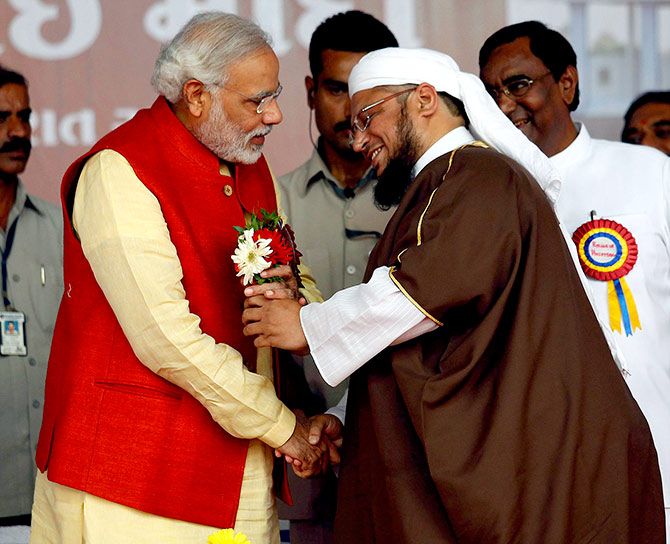
With no opinion poll predicting the ouster of the NDA-BJP government, and with most agreeing that despite a slide in the number of seats Narendra Modi will be back as prime minister beyond May 23, some TV channels wore a decidedly funereal air on Tuesday night -- or maybe that was my imagination working overtime.
Even The Hindu newspaper, by no stretch of imagination favourably disposed towards the current dispensation, in its final opinion poll of the season said it was advantage NDA even though the alliance could fall short of numbers as compared to 2014.
The newspaper did add a caveat to its conclusions: ‘One must however hasten to add, that there does not appear to be any national wave in favour of the ruling party.’
With the final word thus in, the only hope for nay-sayers and assorted Cassandras who have been predicting the fall of this government from the time it was sworn in five years ago, is a repeat of 2004.
On their behalf, it must be said that the Opposition looks to be in a far better shape now in 2019, than it seemed in 2004. And yet, the results, when they came in then, seemed like a bolt out of the blue.
However, there is one thing that is common between 2004 and 2019.
It is that the minority vote, which coalesced behind the Congress 15 years ago giving it the edge against an invincible A B Vajpayee, looks set to do the same thing again.
In 2014, when Modi ran his blitzkrieg, this vote was scattered, confused.
But after five years of this government, the minorities have made up their mind to vote en masse against the incumbent regime.
Once upon a time, this would have sounded the death knell for any government -- remember how not too long ago, stalwarts from all political parties would make a beeline to Jama Masjid, Delhi, to get Imam Bukhari to issue a fatwa to the community to vote for them? -- but not anymore.
Narendra Modi showed in 2014 that the minority vote was not required to form the government in India, by fashioning a Hindu vote.
The minorities are determined to prove him wrong in 2019, and the only way he can counter their mobilisation against his government is to get a bigger share of the Hindu vote.
This is not a ‘hard’ Hindu vote as in the masjid-breaking lumpen, which number thankfully cannot propel any government to power, but the 'soft' Hindu vote.
Not sure who that is?
See no further than the throngs of devotees at the feet of assorted yogis, gurus and godmen, lapping up the so-called new age wisdom they spout, and you will get your answer.
A time to vote
Parchiyaan baant rahi hain galiyon mein
Apne kaatil ka intekhaab karo;
Waqt yeh sakht hai chunaav ka.
Pamphlets are being issued on the road
Asking us to vote for our murderers.
It is clear elections are upon us.
As the nation gets ready to celebrate the festival of democracy that is finally upon us on Thursday, it is the poet’s job to temper the ardour by holding a mirror to society.
And who better to do it than Gulzar, the master lyricist whose every word is filled with nuance.
While the above verse may seem to reflect his despondency with the democratic process, he disabuses one of any such notion in a conversation with The Hindu newspaper.
‘There is only one weapon you have if you don’t like the system or the government. It’s the only way to bring things into action. It can bring about a change, help remove someone from power. You can ask them to go, tell them that you don’t want them,’ he says.
For ultimately it is about the common man, the voter, who he had compared to ‘useless grass’ in a poem about their indestructibility. ‘Maaro, kooto, qatl karo, ya phoonk do inko; Logon mein zinda rehne ki la-matnaahi taaqat hoti hai (Hit/Kill them, grind them to dust, murder them, burn them; people have that indestructible desire to live),’ he had said, but as he clarifies now, 'not with hope but with faith'.
Newsworthy, but not headline-worthy
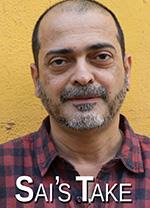
In all the noise over Article 370 generated in the wake of the BJP reiterating in its manifesto its determination to abrogate the special provision, the words of Dr Karan Singh, former Sadr-e-Riyasat (head of state) of Jammu and Kashmir, in a recent interview to The Tribune newspaper have been drowned out.
Which is a tragedy.
In it, the son of Maharaja Hari Singh, the last king of Jammu and Kashmir, dispels the notion that the special status granted to the state was not asked for but given by the Government of India, and nor was it meant to guarantee the state’s Muslim-majority character.
‘There was nothing like that. The word was never used. It is not that we said that we are a Muslim majority state, that’s why we should get special status. The fact is that the special position was offered by the Government of India. Don’t forget that.’
Karan Singh goes on to say that the instrument of accession signed by his father was identical to that signed by other states, but unlike other states which went to merge with the Indian Union, J&K did not because of the war, the United Nations getting involved, etc.
'That’s why Article 370 was put in the Constitution, specifically because there was no merger to ensure the relationship of the state with the rest of the country.'
Now it is very common for politicians to trot out the line that they were misquoted, or they didn’t say what was attributed to them, once the excrement hits the rafters, but in Karan Singh’s case he disputed the headline given by the newspaper, which said: ‘J&K never asked for special status, it was given by Centre’.
The Tribune reported the day after the interview was published that ‘There has been some confusion about a report in The Tribune that misquoted what I had said. I had traced the history of how J&K became the part of India and why it received a special status guaranteed by Article 370 and subsequently by Article 35A.’
‘This was the outcome of detailed consultations between representatives of the ruling National Conference and the Government of India, resulting in the Delhi agreement of 1952, followed by the adoption of the J&K Constituent Assembly of the state constitution in 1957. Thereafter, more articles of the Indian Constitution were extended to the state,' he added.
‘The Tribune headline was not only 'factually inaccurate but politically confusing',' Dr Karan Singh said. But as always, the reporter has stood by the published version.


